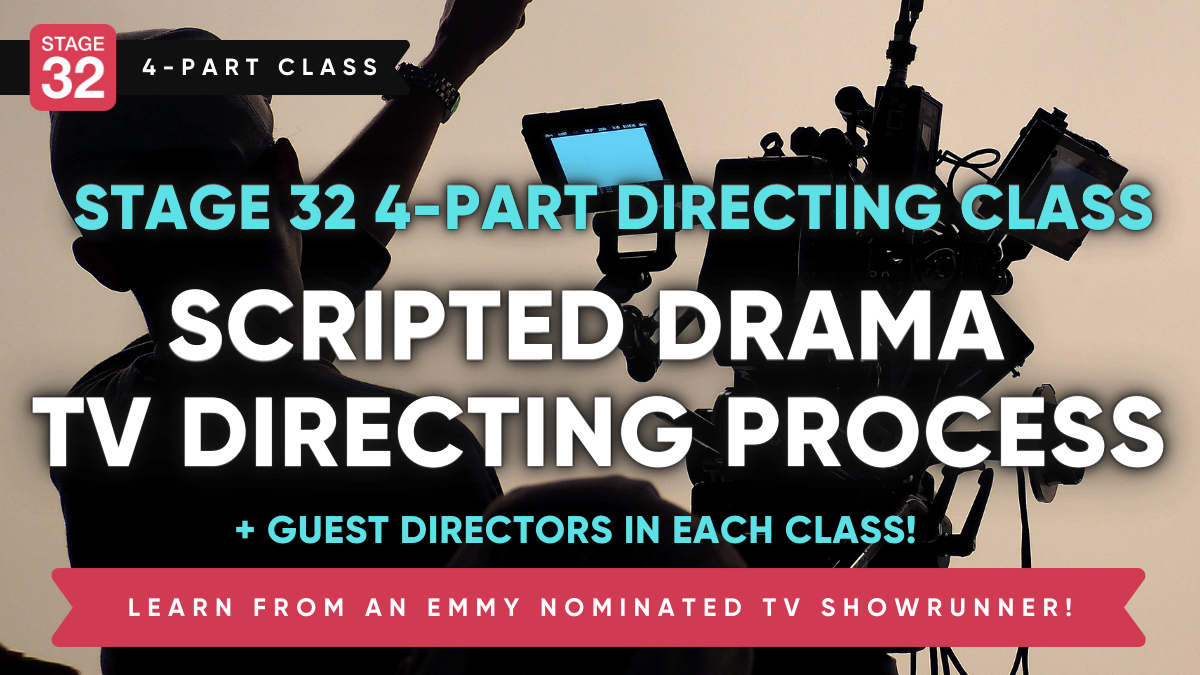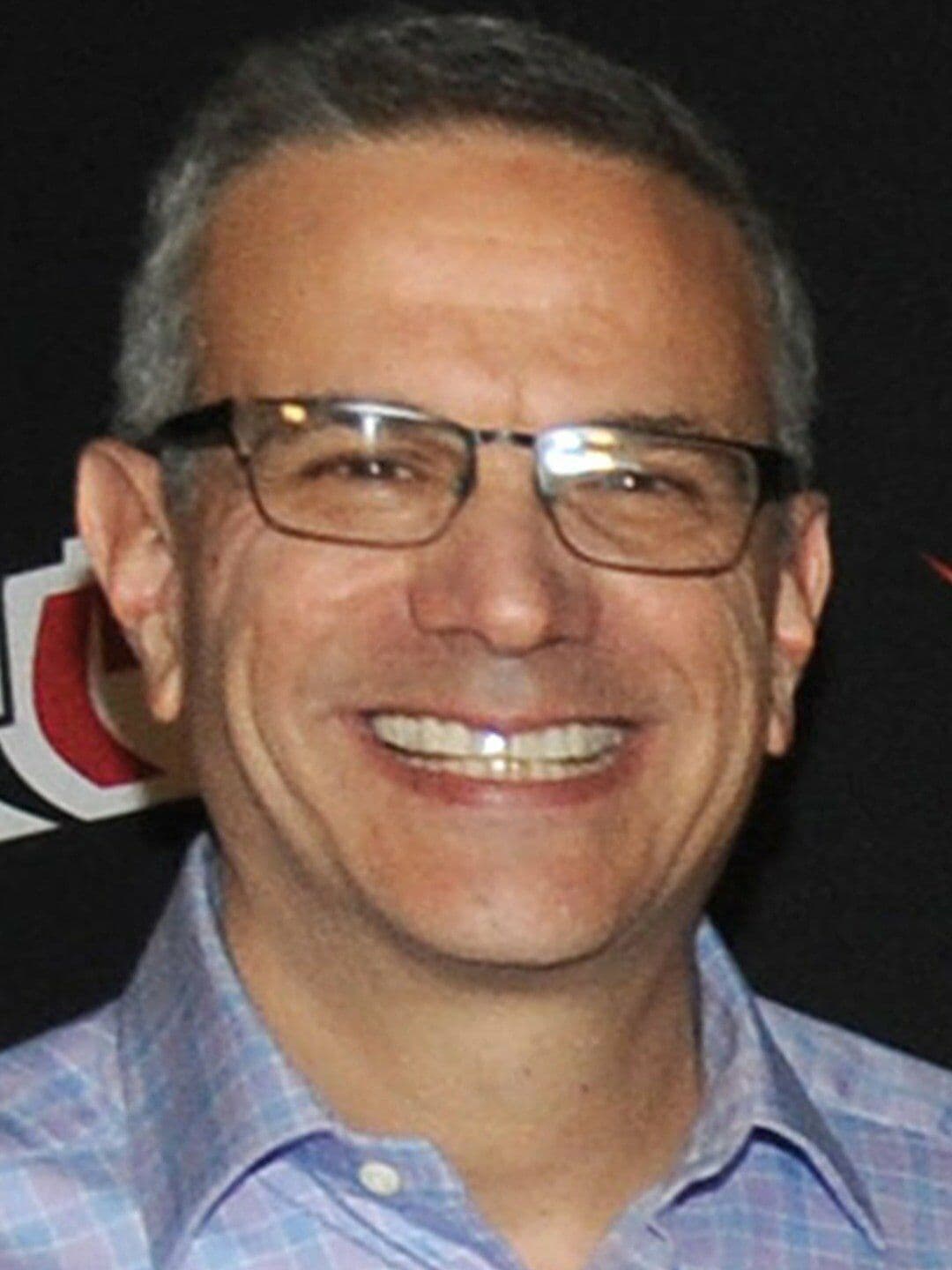

Summary

This class has a 100% satisfaction rating!
Learn from multiple Emmy-nominated TV showrunner Todd Slavkin!
SPECIAL GUEST DIRECTORS join your instructor for each session!

Todd speaking on stage at Comicon in San Diego
The TV director role is more crucial than ever. With an unprecedented number of television shows being produced, the demand for skilled TV directors has skyrocketed. Whether you're an aspiring director or a seasoned professional looking to sharpen your skills, understanding the directing process for scripted drama TV is essential to stand out in this competitive landscape.
Navigating the world of TV directing can be intimidating, and many directors stumble over common missteps. From misinterpreting a script to struggling with on-set logistics, these challenges can hinder your ability to bring a story to life. This class will help you avoid these pitfalls by providing a comprehensive guide to the responsibilities and techniques that define successful TV directing.
You'll be learning from none other than Todd Slavkin, a seasoned showrunner and producer with over three decades of experience in television. Todd's impressive portfolio includes iconic series like SMALLVILLE and SHADOWHUNTERS and most recently, THE MYSTERIOUS BENEDICT SOCIETY, which earned multiple Emmy nominations. Todd has developed pilots for major networks including ABC, NBC, FOX, SYFY, FREEFORM, and The CW. His deep understanding of the industry and practical insights will provide you with the knowledge and confidence to excel in your directing career.
Throughout this exclusive Stage 32 4-part class, you'll gain a thorough understanding of the directing process, from analyzing scripts to post-production. In Session One, you'll explore the job's responsibilities, including prepping episodes and staying on budget. Session Two dives into the prep phase, focusing on meetings and shot-listing. Session Three covers the shoot itself, with tips on blocking scenes and giving notes to actors. Finally, Session Four delves into post-production, offering guidance on working with editors and reviewing cuts. Each session also features a Q&A session with Todd and guest directors, ensuring you will walk away with a well-rounded understanding of what you need to do to direct drama television!
Praise For Todd:
"Todd's experience and expertise shine through. If you've ever wanted to be a showrunner on a TV series then learn all you can from him." -- Rahime B.
"I never realized how much fell on the showrunner before working with Todd. He's a fantastic educator!" - Meg L.

What You'll Learn
WEEK ONE - THE JOB
- What are the responsibilities of a tv director?
- Analyzing the script
- Prepping the episode
- Shooting the show
- Staying on budget and on time
- Editing your director’s cut
- Getting the gig
- Prior film or short film
- Agent or manager
- Watching episodes
- Relationship with studio or network
- Relationship with showrunner
- Meetings and more meetings
- Analyzing the script
- Reading and rereading
- Flagging any major story concerns - Understanding character motivations
- Brainstorming ideas
- Prepare your questions
- Guest director
- Q&A with Todd
WEEK TWO - PREP
- Day One
- Meeting your team
- Bonding with your 1st AD
- The concept meeting
- The art of listening
- The art of asking questions
- Sharing vague ideas
- Meet the showrunner
- A quick hello
- Showering compliments
- Asking creative questions
- Understanding expectations
- Prep meetings
- Concept
- First tone, second tone
- Art department
- Warbrobe
- Stunts
- VFX
- SFX
- The location scout
- Bonding with department heads
- Keep an open mind
- Don’t be rushed
- Don’t settle
- Spend time on each set
- Alone and with 1st AD
- Come up with blocking and shot ideas
- What’s the best angle?
- What hasn’t been shot before?
- Shot-listing
- Fun time, alone time
- Matching style of show
- Coverage is key. Master, medium, close-up - at least
- Complicated means time. Budget accordingly
- Storyboarding doesn’t need an art degree
- Meet the series regulars
- Five minute meet and greets
- Compliments are your best friend
- Prepare them for intimacy or stunts
- Meet the DP
- Your biggest ally
- Take them to lunch or dinner
- Pick their brain. They know the visual approach better than anyone
- Go over any tricky shot ideas
- Agreeing to a board you can shoot
- Trust your 1st AD but trust yourself more
- How long does the scene take to shoot?
- Dealing with script changes
- Nothing is set in stone
- Prepare to pivot
- No shot is precious
- Guest director
- Q&A with Todd
WEEK THREE - THE SHOOT
- Get to set early everyday
- Time alone is time to go over your plan
- Learn every crew member’s first name
- Positive aura with everything you do
- Thank you’s are your best friend
- Give shot-list to 1st AD, DP and script supervisor
- Speech on day one expressing your gratitude and excitement
- Blocking the scene
- Have actors read it through once
- Express your blocking plan in a vague way, let actors create
- Stand where you think the camera will be
- Explain your plan in more detail, adjust accordingly
- Listen to their issues
- Explain WHY you want it your way
- Compromise if need be. You’re here to collaborate
- Patience while lighting
- Play music? Depends on vibe
- Get to know script supervisor and other crew
- Never leave set except to go to bathroom
- Be near monitor to respond to DP framing questions
- Giving notes to actors
- Short, succinct and specific
- Don’t over-explain
- Actors like external behavior notes. Avoid adjectives if possible
- Compliment but don’t over-compliment when it’s not good
- Every actor is different. Learn what they like.
- Three, four takes max, unless there’s a big issue
- Take a nap at lunch if you can
- Your trailer is your sanctuary
- Unwind time is vital
- End of every day
- Thank everyone on set. Even the P.A.
- Order coffee truck one day to show gratitude
- Make speech on last day expressing your love
- Guest director
- Q&A with Todd
WEEK FOUR - POST PRODUCTION
- Take time off right after shoot
- Try not to think about shoot
- Don’t watch the show
- Clear your mind to keep it fresh
- The editor’s cut
- Be complimentary
- Keep an open mind
- Be open to new ideas
- They often know the show better than you
- Working with your editor
- You’re in charge. It’s your episode.
- Disagreeing is okay.
- Don’t worry about hurting feelings
- Never snap or clap suggesting a cut
- Music ideas? Use them. Talk to music supervisor if song is realistic.
- Treat editor and post staff to coffee
- Emails to crew and cast
- After seeing cut, compliment those who deserve it
- Keep spreading positivity
- You did it! Congratulations!
- Guest directing agent
- Q&A with Todd
WHAT TO EXPECT:
- This class is designed for individuals interested in directing television.
- This is an in-depth, practical, and detailed class with significantly more content than a standard 90-minute webinar. Each sessions will be roughly 2 hours in duration.
- You will be held accountable to take the lessons from each session and move your work forward.
Who Should Attend
All levels of directors (advanced, intermediate and beginner) looking to directing television.
All levels of directors (advanced, intermediate and beginner) looking to learn the fundamentals of directing television.
All levels of screenwriters (advanced, intermediate and beginner) looking to learn how to best direct television.
Producers who want to better understand the craft and business of directing television.
Actors who want to take understand the directing process for television.
Executive

Todd Slavkin is a seasoned showrunner and producer with over three decades of experience in television. He has worked alongside his longtime friend and writing partner, Darren Swimmer, to create some of the most beloved shows across various genres. Todd's impressive portfolio includes being a driving force behind iconic series like SMALLVILLE and SHADOWHUNTERS, which won multiple awards including the GLAAD Media Award for Outstanding Drama Series and several People’s Choice Awards. Most recently, Todd has been recognized for his work on THE MYSTERIOUS BENEDICT SOCIETY, earning four Emmy nominations.
Throughout his career, Todd has developed pilots for major networks including ABC, NBC, FOX, SYFY, FREEFORM, and The CW. He was the co-showrunner for MELROSE PLACE 2.0 and contributed to a variety of other successful series such as NO ORDINARY FAMILY, ALPHAS, DEFIANCE, DOMINION, and GUILT. Todd's extensive experience in showrunning and producing has made him a respected figure in the industry, known for his ability to craft engaging stories and develop compelling characters.
He began his career in feature films, writing DARK REFLECTION and CONTROL, starring Ray Liotta, Willem Dafoe and Michelle Rodriguez.
Testimonials
"Todd's experience and expertise shine through. If you've ever wanted to be a showrunner on a TV series then learn all you can from him." -- Rahime B.
"I never realized how much fell on the showrunner before working with Todd. He's a fantastic educator!" - Meg L.